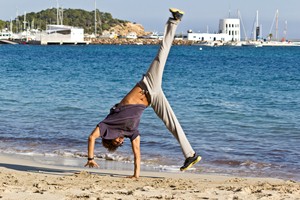Why Exercise Boosts Your Immune System

by Lucy Miller
A Fitness and Nutrition Expert
Yuk, it’s here. Cold and flu season is upon us and if you haven’t had it already, all I can say is lucky you - and keep doing whatever you are doing!
To keep bugs at bay, I am a huge fan of washing, washing, and, washing your hands, especially after the gym. I don’t wish to put you off, but germs and diseases thrive in the warm, sweaty atmosphere on the gym floor, so to avoid illness I always take my by own antibacterial spray or wipes and clean off the equipment before I use it. I recommend you do this too. I know it sounds a bit OTT but seriously you need to think about your health and how many people have been sweating it out on that piece of kit.
I also take my own yoga mat and towel for classes, and avoid touching my eyes, nose or mouth until I’ve washed my hands after my workout because it transfers germs to your mouth, nose, and eyes, which invites the onset of colds and the flu. You should also take your own water bottle. The drinking fountain hosts a plethora of bacteria and viruses, so bring your own bottle of water from home and clean it regularly – don’t just leave it in your gym bag and keep filling it up every time you go!
I’m not saying, ‘Don’t go to the gym to workout.’ All I’m suggesting is that you take precautions to keep the germs away. Exercising is great for boosting your immune system!
In a recent University of Massachusetts study of 547 people, researchers found that the most physically active people had 25 percent fewer upper-respiratory infections over the course of a year than did the couch potatoes.


Researchers believe that exercise may strengthen immune function, because it increases the body's production of white blood cells, meaning you'll have a reduced risk of catching a cold, and IF you do catch one, you should have it for a shorter period of time.
That said, don’t go crazy and sweat yourself sick. Marathon runners are at a greater risk of upper-respiratory infections after a race, so aim for 60 to 90 minutes of moderate activity daily and if you do go a bit mad with the exercise and start to feel a bit coldy, then catch a few extra Z’s, treat yourself to a relaxing massage and eat foods rich in protein (like lean meat), zinc (like seeds) and B vitamins (like wholegrain cereals), which will all strengthen your immune system and ward off colds and flu.
Lucy Miller
Lucy Miller is a fitness and nutrition advisor, and Fitness Editor at Health & Fitness Magazine (www.womensfitness.co.uk). She holds fitness qualifications from NASM Training and Premier Training International.Read her biography

